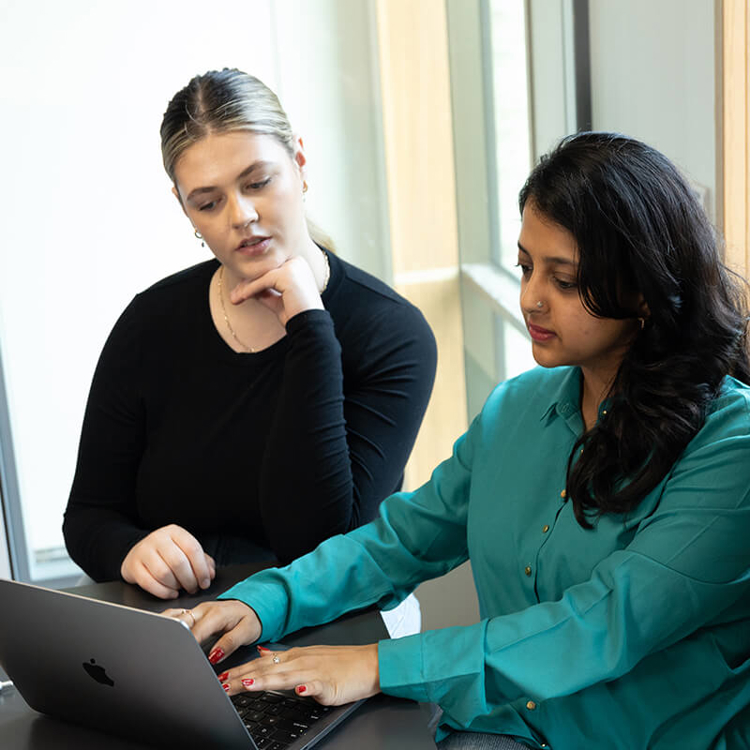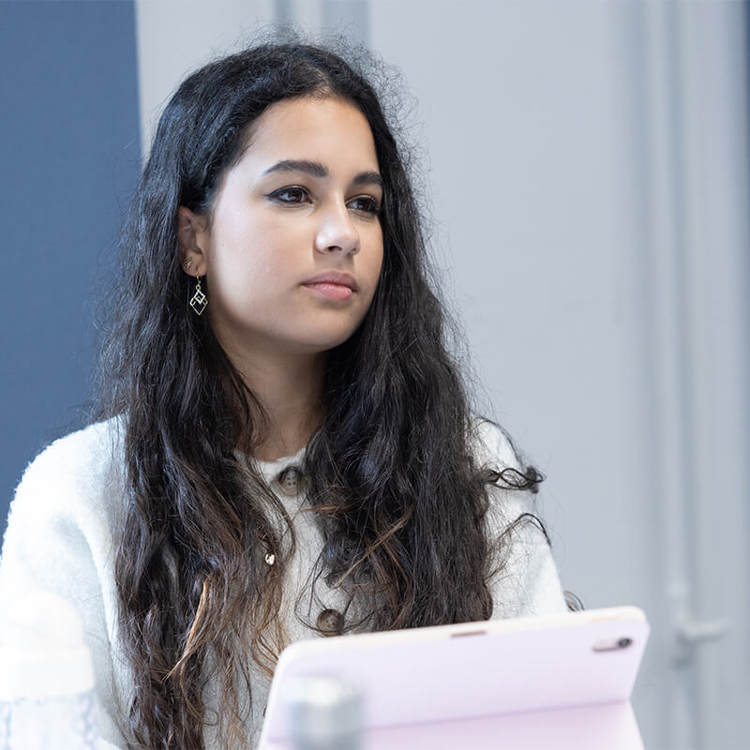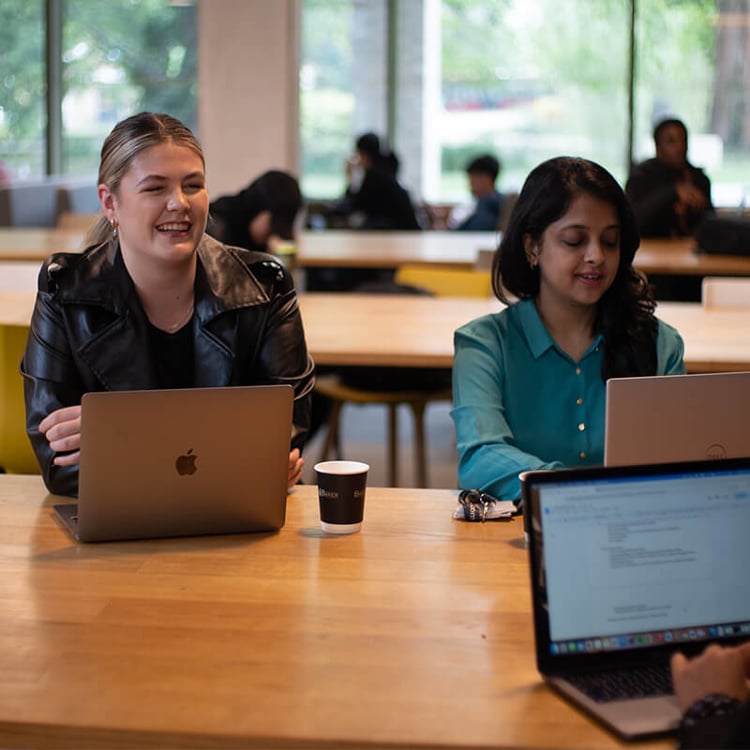Entry tariff:
2025/26 entry: Call 0300 303 8320 to find out if you are eligible for this programme in Clearing
UCAS code:
L110
L120 (If choosing Foundation Year)
Start date(s):
September 2025
September 2026
Clearing
CLEARING 2025
Be Roehampton
Open for Clearing
Call us on 0300 303 8320Complete our Clearing self-application
Gain the skills and experience a future economist would need to make a positive impact in a range of organisations, businesses, industries or in the public sector.
Did you know?
You'll have access to real-live trading information, financial and economic news in our Bloomberg Trading Room and via Reuters Market Data System, which is used by investors and traders across the world.
Top 3 modern university in London
(Complete University Guide 2025)

Ranked in the top 15% in the world
Times Higher Education Young University Rankings 2024

Economics ranked 1st in London for Assessment and Feedback, Organisation and Management and Student Voice
National Student Survey 2024

Foundation Year
This course can also be studied with a foundation year (September entry only).
Modules
30 credits
This module extends and develops understanding of the standard approach to decisions based on optimisation: utility maximisation amongst individuals and profit maximisation among firms. The module shows how this approach can be embedded in formal models of equilibrium exploring a variety of competitive situations, including strategic interactions among businesses and intertemporal choice.
Moreover, building on the foundations of standard (neoclassical) economics, you will learn to apply behavioural economics concepts and findings to predict economic actors' seemingly irrational behaviour.
Teaching and learning
You will be taught through lectures and workshops that involve a range of learning and teaching approaches, which includes online support and employability-related activities.
Lectures will cover core material, and in workshops you will engage in solving practical exercises aimed at supporting and consolidating your learning.
You will utilise software and tools that enable you to apply your knowledge in cases/policies-based study. You will acquire experience working with applications such as Excel and AI-enhanced tools to simulate market and strategic interactions.
Assessment
This module will be assessed by online multiple-choice and short questions test (30%) and open-book assignment (70%).
30 credits
You will gain insights from economic theory which is relevant to applications in managerial decision making. The module bridges the gap between economic theory and the day-to-day decision-making process of managers. The emphasis is on applying microeconomics concepts to solve problems, so to understand how business executives and other policy makers should take decisions.
The module material explains how EDI concepts, such as fair distribution of resources and income inequality impact business decisions. It also analyses diverse market segments and how consumer preferences can vary across different demographic groups, emphasising the importance of understanding these differences in management decisions.
You will be exposed to global examples to illustrate how economic policies, market structures, and managerial decisions differ across countries and cultures. The module also discusses how businesses must adapt their strategies in different cultural contexts.
You will look at practical projects, case studies, and simulations that mimic real-world business challenges. These will develop your critical thinking, problem-solving, and communication skills, which are essential for career success in managerial roles.
Teaching and learning
You will be taught through lectures and workshops that involve a range of learning and teaching approaches, which includes online support and employability-related activities.
Lectures will cover core material, and in workshops you will engage in solving practical exercises aimed at supporting and consolidating your learning.
You will use analytical software (i.e., Excel and Stata) and tools that are prevalent in business decision-making, to enhance your analytical skills. You will experiment win simulation games that will allow you to experiment with economic models and decision-making in a virtual environment.
Assessment
This module will be assessed by an online submission of data analysis supported by AI (30%) and an assignment based on a case study (70%).
30 credits
You will gain insights on the determination of macroeconomic variables and the effects of policy decisions. The module looks at these features of the economy distinguishing between short, medium, and long run. You will expand your understanding of general macroeconomic dynamics by also looking at the functioning of international trade and how globalisation affects the impact of macroeconomic policies.
The module looks at diverse perspectives in economic theories, focusing on case studies from various cultures, and contributions from economists of different backgrounds. It also highlights how macroeconomic policies affect various demographics differently.
You will look at concepts like sustainable growth, green economics, and the role of government and markets in promoting environmental sustainability. Alongside exploring the macroeconomic policies' impacts on ecological sustainability, such as carbon taxation, renewable energy investment, and regulatory frameworks.
You will look at practical projects, case studies, and simulations that mimic professional economic analysis and decision-making processes. These will develop skills that are valuable in the job market, such as data analysis, data manipulation, and policy evaluation.
Teaching and learning
You will be taught through lectures and workshops that involve a range of learning and teaching approaches, which includes online support and employability-related activities.
Lectures will cover core material, and in workshops you will engage in solving practical exercises aimed at supporting and consolidating your learning.
You will use technology for simulations, data analysis, and visualisation of economic data to gain a hands-on learning experience. You will enhance your data literacy skills by incorporating training on using economic databases, statistical software and programming tools relevant to macroeconomic analysis.
Assessment
This module will be assessed by an online submission case based on macroeconomics data analysis and reporting (30%) and an assignment based on four mini essay questions (70%).
30 credits
This module looks at the statistical tools needed to understand empirical economic research and to evaluate public policy interventions or market competition. Additionally, it aims to equip you with digital data-driven skills to plan and execute independent quantitative projects.
The module material explains how EDI concepts, such as fair distribution of resources and income inequality impact business decisions. It also analyses diverse market segments and how consumer preferences can vary across different demographic groups, emphasising the importance of understanding these differences in management decisions.
You will be exposed to global examples to illustrate how economic policies, market structures, and managerial decisions differ across countries and cultures.
The module activities incorporate simulations, role-playing, and project-based learning that mimic real-world business challenges. These activities focus on developing your critical thinking, problem-solving, and communication skills which are essential for career success in managerial roles.
Teaching and learning
You will be taught through lectures and workshops that involve a range of learning and teaching approaches, which includes online support and employability-related activities.
Lectures will cover core material, and in workshops you will engage in solving practical exercises aimed at supporting and consolidating your learning.
You will use analytical software (i.e., Excel and Stata) and tools that are prevalent in business decision-making, enhancing your analytical skills. Course activities also implement simulation games that allow you to experiment with economic models and decision-making in a virtual environment.
Assessment
This module will be assessed by practical econometrics work in Excel/SPSS assignment (50%) and a group presentation (50%).
These are the current planned modules on this course and may be subject to change.
This course is subject to validation.
This course offers all students the option of a one-year paid work placement, to boost your employability even further. If you choose this route, you will take the placement following year two of your course, and then return to complete your degree.
Why take a placement?
A placement year is the perfect opportunity to gain valuable work experience, to build on the career skills we will teach you on this degree. The connections you make on the placement will improve your career prospects further, and equip you with the skills you need to secure graduate-level employment.
How we support you
The University's Placement and Work Experience Team are experts at helping you to secure a placement. They will work closely with you from the start, helping you research potential employers, discover placement opportunities, create and pitch your CV, and will coach you to perform well in interviews. We aren't able to guarantee a placement, but our sector-leading advisors will give you the best possible chance of securing one.
Find out more about how we'll support you
We understand that your plans might change once you start your programme. If you decide not to do a placement, you will have the option of completing the three year version of your programme.
Whatever your choice, you will have access to many opportunities for work experience through our Placement and Work Experience Team, and access to face-to-face and 24/7 online careers support.
30 credits
This module develops essential quantitative skills, financial theory, product knowledge, and cognitive ability for the capital markets investment industry. It covers market characteristics, asset classes, portfolio theory, fixed income, equities, selected derivatives, and relevant quantitative techniques.
It also distinguishes personal wealth management from institutional fund management to enhance employability. This module covers both institutional fund management and personal wealth management, enhancing financial literacy and making investment decision-making accessible.
You will develop financial data literacy and basic quantitative skills through an investment advisory project, improving your employability.
Teaching and learning
You will be taught through lectures and workshops that involve a range of learning and teaching approaches, which includes online support and employability-related activities.
Lectures will cover core material, and in workshops you will engage in solving practical exercises aimed at supporting and consolidating your learning. A compulsory component, a Bloomberg certificate programme, will make you familiar with industry-standard financial information services.
Teaching is supported by quantitative spreadsheet modelling and financial software, immersing you in a technology-driven environment that reflects real-world industry practices.
Assessment
This module will be assessed by a practical industry-led certificate (50%) and a group assignment (50%).
30 credits
This module applies economic analysis to current trends and key challenges in the global economy.
The topics covered include economic growth and inequality across nations, climate change, demography, health, labour, artificial intelligence, institutions and development, and the macroeconomic conditions that have emerged in the aftermath of the great recession and the COVID-19 pandemic.
By studying this module, you will gain a fundamental understanding of the factual context surrounding today's challenges and how economics can be used to both illuminate major global problems and aid in designing effective policies. Additionally, you will benefit from opportunities for group work, which will enhance your collaborative and discussion skills.
You will examine economic inequalities, labour market disparities, and institutional responses to demographic shifts. Through case studies, you will assess how policies shape opportunities and explore solutions for fostering more inclusive economic systems.
You will explore the economic impact of climate change, biodiversity loss, and environmental policies, emphasising sustainable growth strategies. You will analyse policies such as carbon taxation and green innovation, gaining insights into balancing economic development with environmental responsibility.
Teaching and learning
You will be taught through lectures and workshops that involve a range of learning and teaching approaches, which includes online support and employability-related activities.
Lectures will cover core material, and in workshops you will engage in solving practical exercises aimed at supporting and consolidating your learning.
You will be equipped with practical skills for careers in economics, policy, and finance. Through data analysis, case studies, and group projects, you will apply economic theories to real-world challenges, enhancing your analytical and problem-solving abilities.
By integrating digital tools, economic simulations, and AI-driven analysis, the module will enhance your ability to engage with complex economic data. It also explores the impact of automation and AI on labor markets and education, preparing you for a tech-driven economy.
Assessment
This module will be assessed by a group presentation (30%) and an essay (70%).
30 credits
This intensive six-week taught module is designed to equip you with the essential competencies needed for professional consultancy practice.
This module serves as the skills-based foundation for the concurrent Roehampton Live Project, providing you with theoretical frameworks, practical tools, and professional capabilities required to deliver high-quality consultancy services to real clients.
Delivered as a professional bootcamp in a blocked format, this module creates an immersive learning environment where you will develop expertise in consultancy methodologies, client relationship management, strategic problem-solving, and professional communication. The intensive structure enables you to build confidence and competence before engaging with live client projects.
You will learn to integrate ethical considerations, social responsibility, and environmental sustainability into your consultancy approach, ensuring that your professional practice contributes to broader societal wellbeing.
Key areas of focus include consultancy frameworks and methodologies, client engagement and relationship management, evidence-based research and analysis techniques, strategic thinking and recommendation development, professional communication and presentation skills, and ethical consultancy practice and sustainability integration.
You will engage in real case studies and simulated client scenarios, working individually and in teams to apply learned concepts. The module incorporates guest speakers from industry, practical workshops, and reflective exercises to bridge theory and practice effectively.
This module prepares you for immediate application of skills in your concurrent Live Project module, where you will work with real clients as part of the ‘Roehampton Business Advice Centre’.
Teaching and learning
The module employs intensive blocked delivery with high contact hours to create an immersive professional development experience. Teaching methods include interactive workshops, case study analysis, simulation exercises, guest speaker sessions, and peer learning activities.
You will have 22 hours of lectures and 33 hours of workshops over six weeks. Lectures and workshops will be interactive in nature providing an environment for sharing business ideas, problem space mapping and evaluation opportunities and carrying business scoping exercise.
Assessment
This module will be assessed through a consultancy toolkit portfolio (50%) and a consultancy bid presentation (50%).
30 credits
This transformative capstone module is designed to bridge the gap between academic study and professional practice. You will have the opportunity to apply your academic knowledge in a real-world setting, developing strategic solutions to real-world business challenges.
You will work in consultancy teams as part of the Roehampton Business Advice Service, collaborating with a diverse range of external clients, including small and medium enterprises (SMEs), non-profit organisations, social enterprises, and larger companies. Global engagement projects will also be sought with partners outside of the UK, or projects that can have an influence on communities globally.
Each team will engage with a client to diagnose business problems, conduct in-depth research, and formulate evidence-based recommendations. By making an impact through real-world projects, you will enhance your ability to navigate complexity, synthesise information, and communicate your insights effectively to senior stakeholders.
While teamwork is a core aspect of this module, you will also undertake substantial individual work, ensuring that your personal contributions are critically assessed and aligned with your professional aspirations. The module is structured to simulate a professional consultancy environment, equipping you with the practical skills, commercial awareness, and adaptability needed for leadership roles in business and beyond.
You will be encouraged to develop ethical, socially responsible, and sustainable business solutions, ensuring that your recommendations contribute not only to organisational success but also to broader societal and environmental wellbeing.
Through a combination of practical experience, academic rigor, and reflective work-based learning, you will be empowered to become a strategic thinker, problem solver, and an influential professional. The module is designed to be a stepping stone into a range of career paths, with projects aligned with your own career goals. By the end of this module, you will have built a portfolio of high-quality work that demonstrates your analytical, decision-making, and communication skills.
Teaching and learning
Each consultancy team will be assigned an academic supervisor who will provide structured guidance, feedback, and oversight throughout the project.
You will have scheduled supervision meetings, including meetings with your supervisor at key milestones during the project to discuss progress, challenges, and next steps. Supervisors will support you in managing client relationships and ensure professionalism in communications.
Assessment
This module will be assessed by a consultancy report (50%) and a live presentation (50%).
These are the current planned modules on this course and may be subject to change.
This course is subject to validation.
This course offers a foundation year, which takes place at the beginning of your studies. Studying a foundation year will give you academic and practical experience, and a strong introduction to your subject, ensuring you succeed on your undergraduate degree.
30 credits
You will develop your core academic and integrated English language skills of speaking, listening, reading and writing. You will become familiar with key academic skills and concepts, such as referencing methods and awareness of academic integrity and tone. You will apply these skills and knowledge to both broad topics and also your chosen subject pathway.
Teaching and learning
You will be required to actively engage in on-campus learning for up to 10 hours a week.
You will be taught through a full range of teaching and learning methods, which include lectures, seminars, workshops, discussion groups, group directed tasks and presentations. This will enable you to learn from your peers and tutors in both structured and information settings.
You will be encouraged to think creatively about your approach to learning and discussions with your peers. You will also have access to recordings, resources, links and signposting through Moodle to enrich your learning.
Assessment
You will be assessed through group and individual presentations, comparative and reflective essays, multiple choice exams, coursework and reports, oral exams, portfolios, case studies and blogs.
30 credits
You will develop your core academic and integrated English language skills of speaking, listening, reading and writing. You will become familiar with key academic skills and concepts, such as referencing methods and awareness of academic integrity and tone. You will apply these skills and knowledge to both broad topics and also your chosen subject pathway.
Teaching and Learning
You will be required to actively engage in on-campus learning for up to 10 hours a week.
You will be taught through a full range of teaching and learning methods, which include lectures, seminars, workshops, discussion groups, group directed tasks and presentations. This will enable you to learn from your peers and tutors in both structured and information settings.
You will be encouraged to think creatively about your approach to learning and discussions with your peers. You will also have access to recordings, resources, links and signposting through Moodle to enrich your learning.
Assessment
You will be assessed through group and individual presentations, comparative and reflective essays, multiple choice exams, coursework and reports, oral exams, portfolios, case studies and blogs.
30 credits
You will develop your research, numeracy and information technology skills. You will investigate the difference between primary and secondary research, conduct your own research project and demonstrate your findings through data analysis. You will also develop your awareness of equality, diversion and inclusion in the UK, through a real-world issue; discrimination in the workplace.
Teaching and learning
You will be required to actively engage in on-campus learning for up to 10 hours a week.
You will be taught through a full range of teaching and learning methods, which include lectures, seminars, workshops, discussion groups, group directed tasks and presentations. This will enable you to learn from your peers and tutors in both structured and information settings.
You will be encouraged to think creatively about your approach to learning and discussions with your peers. You will also have access to recordings, resources, links and signposting through Moodle to enrich your learning.
Assessment
You will be assessed through group and individual presentations, comparative and reflective essays, multiple choice exams, coursework and reports, oral exams, portfolios, case studies and blogs.
30 credits
This module provides you with a foundational understanding of the principles and practices of business. You will explore the fundamental concepts of business environments, legal structures, and organisational dynamics, focusing on small and large businesses.
With the introduction of key principles of sustainability, social responsibility, and inclusive business practices in a globalised economy, it is expected that you will develop an understanding of contemporary issues affecting businesses at both local and global levels. The transferable skills you will develop in taking this module will enable you to critically evaluate new business ventures, create mission and vision statements, and engage in collaborative activities to develop essential teamwork and communication skills.
The module follows a thoughtful combination of theory, applied learning and reflective practices. By emphasising real-world applications, ethical considerations and global awareness, you will become a responsible, skilled and adaptive business professional.
Teaching and learning
Through interactive workshops, role-play activities, and case studies, it is expected that you will develop practical skills in business planning, stakeholder analysis, and strategic thinking.
The teaching delivery for each module consists of one, one-three-hour lecture and one, two-hour seminar per week. Seminars will consist of individual, group activities and role plays.
You will also have an additional 30 minutes of online support each week, which will consist of individual tasks such as quizzes, posting on discussion forums, watching videos and taking notes and reading.
Assessment
This module will be assessed using a business pitch and an individual written report.
40% - formative assessment where you will identify sources of business ideas (300 words) and summative assessment, where you will be required to present a business pitch to an audience of investors.
60% - individual written report, using a start-up company of your choice to identify and evaluate key challenges faced.
30 credits
This module delves deeper into core business functional areas and includes topics such as: marketing, finance, Human Resource Management (HRM) and leadership. The module is structured to enable you to gain an understanding of analytical frameworks such as SWOT, PESTLE and Porter’s Five Forces that will enable you to evaluate as well as identify opportunities and challenges within different business environments. The transferable skills you will develop in taking this module will enable you to critically evaluate the key functional aspects of business operations and application of theory to practice.
You will also evaluate the principles of product life cycle, and business portfolio management. This exploration will further develop your foundational skills that will enable you to deal with real-world business challenges and engage in critical discussions. Additionally, the module design follows a thoughtful combination of theory, applied learning and reflective practices, emphasising real-world applications, ethical considerations and global awareness, preparing you to become a responsible, skilled and adaptive business professional.
Teaching and learning
This module will be delivered to ensure active interactions through workshops and seminar activities while focusing on practical applications, such as cost behavior, breakeven analysis, market research, recruitment processes, and globalisation.
The teaching delivery for each module consists of one, one-three-hour lecture and one, two-hour seminar per week. Seminars will consist of individual, group activities and role plays.
You will also have an additional 30 minutes of asynchronous digital support each week, which will consist of individual tasks such as quizzes, posting on discussion forums, watching videos and taking notes and reading.
Assessment
This module will be assessed using a group presentation and an individual written report.
40% - group presentation, where you will use relevant tools to evaluate the macro environment of a business organisation of your choice.
60% - individual written report, acting like an independent management consultant, you will write an analytical business report on a company of your choice on how it can gain or increase its competitive advantage.
These are the current planned modules on this course and may be subject to change.
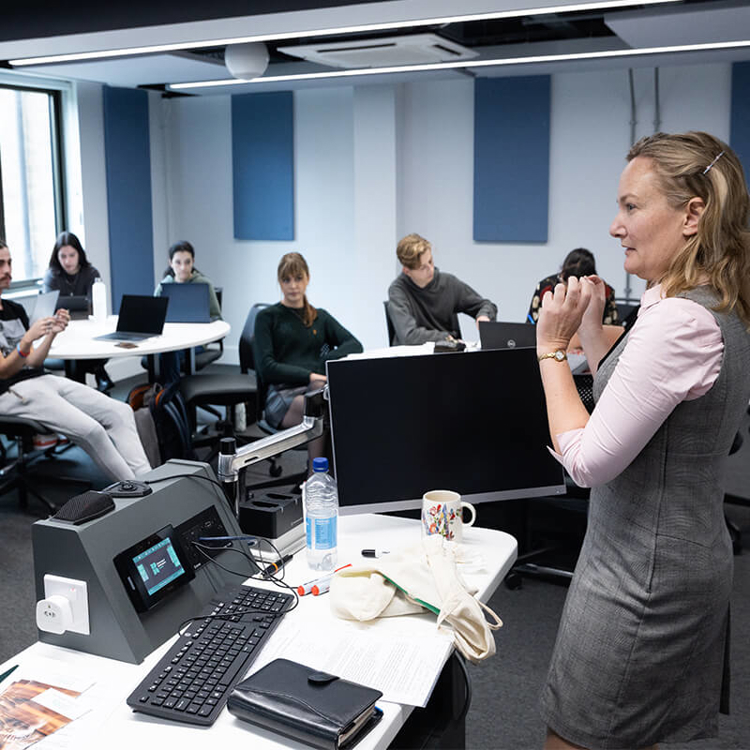
Skills
Make your mark with the practical and transferable skills that matter most to employers.
Gain invaluable experience by solving real-world problems, addressing important social issues and policy questions.
With our BSc Economics, you’ll test your understanding of theory with real-world examples in the core aspects of economics, including:
- Policy
- Portfolio analysis
- Data analysis
- Responsible management
You’ll learn how different methods and tools are used to tackle issues and problems of economic policy and our annual Business Readiness modules will help enhance your employability.
As your financial skills grow, you’ll develop the commercial acumen, emotional intelligence, and self-reflection you need to realise your goals.
And you can put these skills into practice with an optional work placement after Year 2. Fully supported by our Placement Office, this is a chance to gain real-world experience before you graduate and get paid while you make valuable connections.
Learning
Belong, believe and achieve through our practical approach to accounting.
More than just another Business School, we are a diverse learning community that values:
- Excellence
- Reflection
- Inclusivity
- Ethics
- Collaboration
We deliver a modern, practice-based curriculum, with a focus on sustainability.
In high-spec facilities and using the same tools as industry professionals such as our new Bloomberg Trading Room and access to Reuters Market Data System, you’ll explore:
- Real-live financial and economic news
- Managerial economics
- Contemporary Issues
- Sustainability and global responsibility
You’ll also take a Business Readiness module each year, designed in line with the CMI’s employability framework to help you develop key skills.
Our faculty of academic experts and working professionals will guide you through a blended mix of:
- Lectures
- Seminars
- Independent learning
- Online study skills
- Assessment preparation sessions
As our courses are taught over no more than three days per week, you’ll have the flexibility to take on paid part-time work, placements, or internships – gaining real-world experience before you graduate.
We apply world-leading research and the latest thinking to your studies to help you develop a global mindset. You can also gain international experience through an optional semester abroad, with Roehampton Abroad scholarships of up to £1,000 available to help with the cost.
Our Bloomberg Suite
Where your future in finance begins!
Whether you chose to study finance, business management, or economics at the University of Roehampton, one thing is for sure – you’ll have access to our Bloomberg Terminals, which are located right here on our southwest London campus.
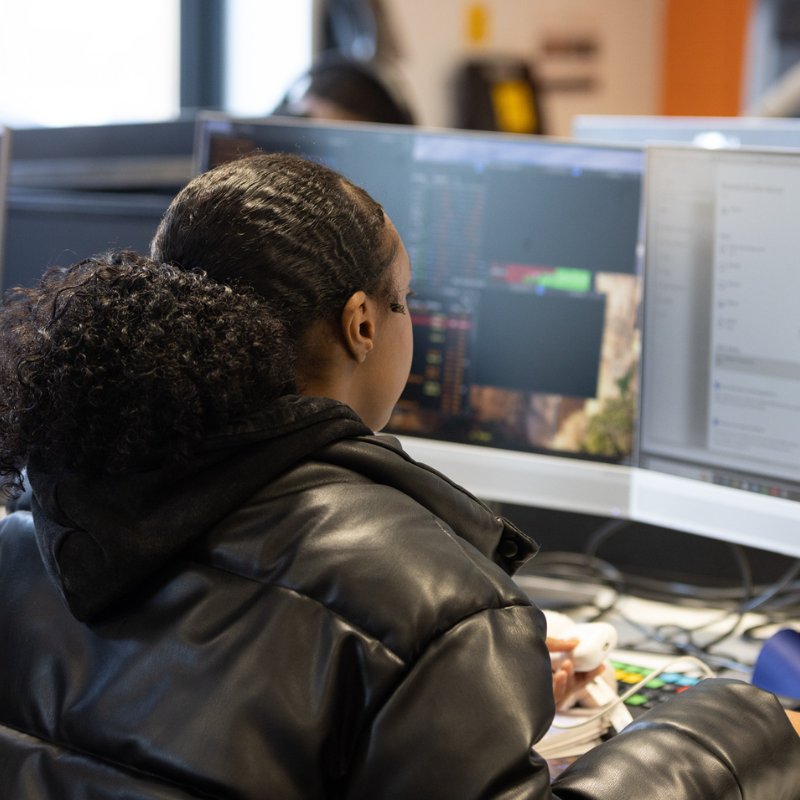

Assessment
Benefit from assessments that prepare you for life beyond university.
You'll be assessed using a wide range of theory and practical assessments that replicate the world of business today. This includes coursework, reports, exams (on Accountancy and Finance modules only) and online tests.
Other types of assessments include portfolio evaluation, case studies, critical poster, consultancy projects and using the Bloomberg terminal to track performance of a live asset. All of these methods will help you demonstrate the breath and knowledge you've learnt.
Between Years 2 and 3, you can choose to enhance your practical work experience by applying for a year-long paid professional placement.
Career
Earn a degree that you can do economics with.
With its optional paid work placement and accreditation (subject to approval) by the CISI, our BSc Economics degree is the ideal launchpad for careers in:
- Financial institutions and banking
- Business management
- Consulting and commerce
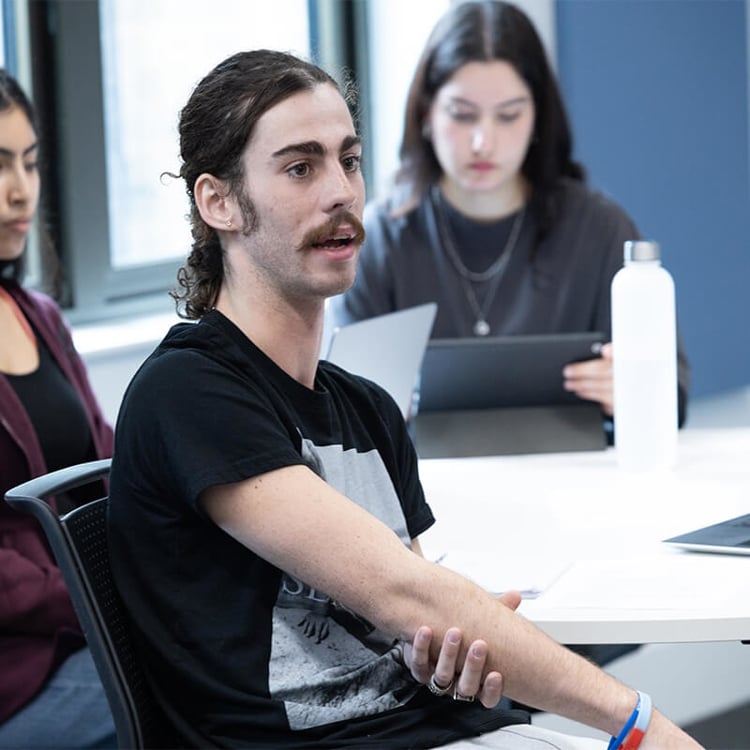
Wherever you want to go in the future, you’ll be preparing for the world of work from day one at Roehampton, with regular access to:
- Employability events
- Guest industry speakers
- Networking opportunities
- Personalised mentoring and careers support
You’ll graduate ready to grab every opportunity that comes your way.
How our careers service supports you
Our careers support team is available to support you from the start of your studies until after you graduate. We will help you build your CV, prepare for interviews, and meet and learn from successful graduates working at the top of their careers.
You’ll also have opportunities to work with our partners across London and beyond, and to attend a Roehampton jobs fair where you can find out about graduate opportunities and meet employers.
Open days
Get a real taste of our campus, community and what it’s like to study at Roehampton
Applying
Full-time UK undergraduate students apply through UCAS.
Entry tariff
2025/26 entry: Call 0300 303 8320 to find out if you are eligible for this programme in Clearing
Looking to work out your UCAS points or find out about our entry requirements? Find out more.
When we consider applications to study with us, we form a complete view of your achievements to date, and future potential, and can offer flexibility in entry requirements. Find out more about our Contextual Offer scheme.
General entry requirements
September 2025 entry tuition fees
UK (home) tuition fees
Undergraduate degree: £9,535
Foundation Year: £5,760
We offer a wide range of scholarships and bursaries. See our financial support pages for UK students.
We also provide other ways to support the cost of living, including free buses and on-campus car parking, hardship support and some of the most affordable student accommodation and catering in London. Find out more about how we can support you.
International undergraduate students apply through our direct application system.
Entry tariff
2025/26 entry: Call 0300 303 8320 to find out if you are eligible for this programme in Clearing
Looking to work out your UCAS points or find out about our entry requirements? Find out more.
When we consider applications to study with us, we form a complete view of your achievements to date, and future potential, and can offer flexibility in entry requirements. Find out more about our Contextual Offer scheme.
General entry requirements
September 2025 entry tuition fees
EU and international tuition fees
Undergraduate degree: £16,950
Foundation Year: £16,950
International Foundation Pathway: £16,950
We offer a wide range of scholarships and bursaries. See our financial support pages for international students.
We also provide other ways to support the cost of living, including free buses and on-campus car parking, hardship support and some of the most affordable student accommodation and catering in London. Find out more about how we can support you.


